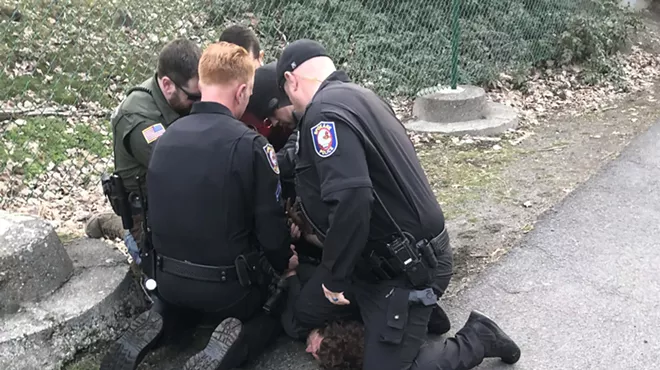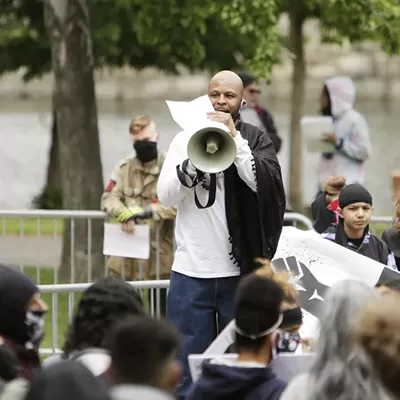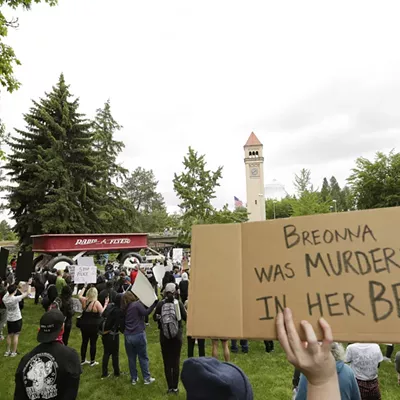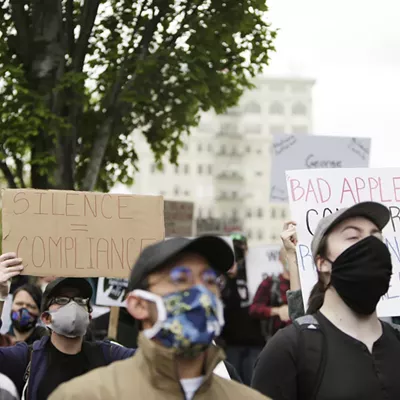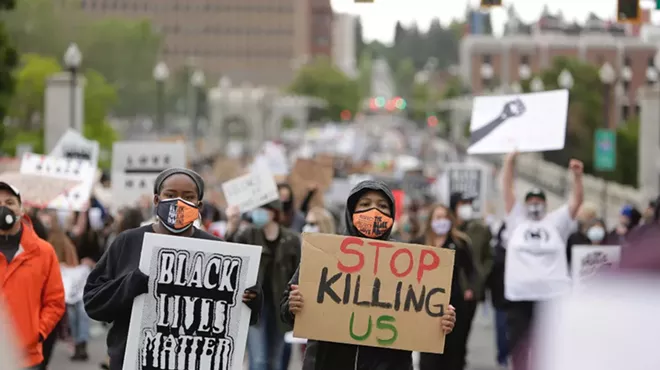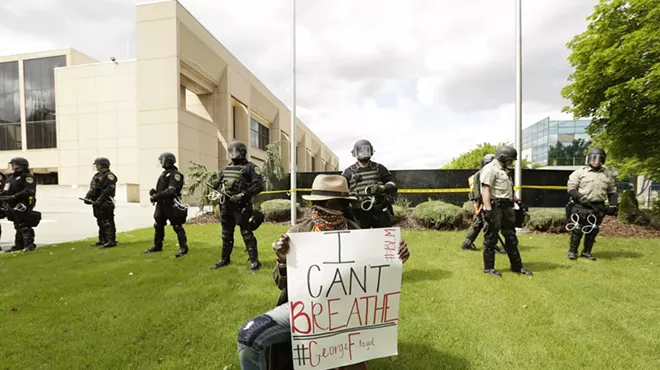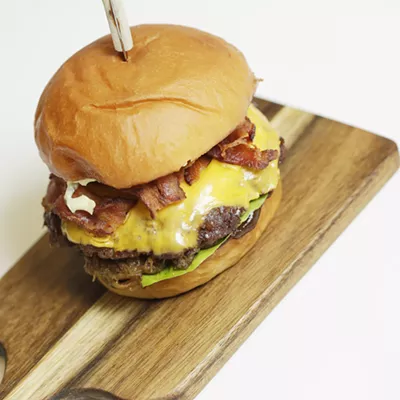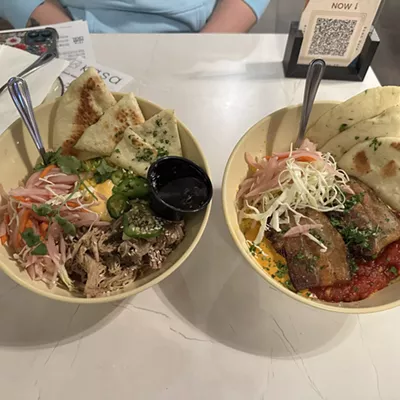
Last Sunday’s large protest in downtown was one of hundreds taking place across the country due to reignited outrage at excessive use of force by police and police killings of minorities in America. Many have led to violent confrontations between police, protesters and looters/vandals.
In the days since Spokane’s biggest demonstration Sunday, law enforcement agencies report they’ve been working to root out threats of violence against continued protests in the area.
Spokane County Sheriff Ozzie Knezovich confirmed local and federal law enforcement have been investigating threats to detonate an explosive or incendiary device downtown this week, as well as threats by white supremacists.
"Quite frankly this is still such a fluid situation there’s a lot of information coming in. We’re constantly trying to stay up on it," he says. "We have had these threats and we are working through them and tracking every lead that we find."
Knezovich says his deputies tracked down Eddie McBride, a white supremacist in Spokane whose social media posts had been widely shared as he appeared to threaten violence by saying he and other "counter-protesters" could go down "in the history books."
"He is gonna show up to the protest, but swears up and down he’s not gonna cause problems, and says he just wants to counter-protest," Knezovich says. "We're like, 'You do realize that's just gonna throw fuel on the fire?' and we tried to talk him out of that. That type of element is very concerning. He is a white supremacist, there's no ifs, ands, or buts about this."
Because of the fluid situation as threats continue to be investigated, organizers of Sunday's event, including the Spokane NAACP, Occupy Spokane, and StudentStrike Spokane, planned to announce the location of the protest closer to the actual start time of the event.
Throughout this week, cities around the nation and the world have continued to see protests and tense clashes with police often involving tear gas, rubber bullets, bean bag rounds, and flash-bangs. More than 15 people around the country have died so far during the protests (including peaceful protesters, bystanders, police officers and looters), nearly all from gunshots.
Floyd, a 46-year-old black man was killed in Minnesota last week when officer Derek Chauvin knelt on his neck for nearly 9 minutes. Floyd was being arrested on suspicion of using a fake $20 bill at a store, and cried out repeatedly after he was pinned, "I can't breathe."
Chauvin and three other officers involved in the arrest were fired from their jobs the next day, and Chauvin had been charged with third-degree murder before last Sunday's protest in Spokane. But many here and around the country were calling for the other officers involved to be charged with crimes, too, and more broadly, for systematic reforms to prevent police brutality.
On June 3, Chauvin's charges were raised to second-degree murder, and the other former officers involved, Tou Thao, Thomas Lane and J. Alexander Kueng, were charged with aiding and abetting murder, according to criminal complaints.
But protests continue as millions call for solutions to the larger issues that have repeatedly prevented justice in cases where law enforcement officers have abused their power, often at the cost of black, Native American and other minority lives.
Spokane's protest last Sunday appeared to end peacefully after hours of a sometimes tense standoff between a crowd of thousands and police in riot gear who'd been stationed to protect the Spokane County Courthouse and Public Safety Building.
However, soon after, a significantly smaller group of a few hundred people went downtown, and while many had returned to Riverfront Park to continue their peaceful protest, a few people walking through downtown kicked in the windows at the Nike store, where looters quickly dashed in and stole items before running off.
Police soon launched tear gas, and everyone remaining downtown was assumed to be participating in a riot. For hours, officers tried to move people out of downtown, issuing warnings over loudspeakers that were sometimes difficult to hear or understand, before launching tear gas, flash-bangs, rubber bullets and bean bags towards protesters. As the night wore on, a few bad actors broke windows of businesses and sprayed graffiti on buildings, and threw gas canisters, water bottles and other objects at officers.
Many remaining downtown continued to show their intent to peacefully protest, chasing off those who were committing crimes and staying out even after Mayor Nadine Woodward issued a curfew, at times sitting or kneeling on the ground, or putting their hands in the air to chant, "Hands up, don't shoot."
The next day, many protesters returned to help clean graffiti and broken glass and City Council unanimously passed a resolution that night expressing support for more implicit bias and de-escalation training, for independent civilian oversight by the ombudsman for uses of force, and for changes to city laws around potentially deadly police tactics.
Kurtis Robinson, president of the Spokane chapter of the NAACP, says he's had several conversations with Woodward, Spokane Police Chief Craig Meidl, Spokane City Council members, Knezovich and others in the days since, as many in the community continue their call for accountability.
"We’re all working on really coming to a common theme and understanding where we’re at, how we got here, and where we need to go," Robinson says.
In addition to discussing a possible change to use-of-force policies and increasing implicit bias training, Robinson says he's been pushing for independent investigation capability for the police ombudsman, for mandatory body camera usage, and for "distinct and explicit accountability outcomes for officers who violate current procedures and policies, and making sure that those have a lasting effect."
"Because what we’ve seen many times is officers get fired and either suffer no consequences or get their jobs back," Robinson says.
But while he says he and many others are hopeful for changes to the criminal justice system, these reforms are things that people have been pushing for, for a very long time.
"It falls back to, 'Do you really mean it this time?' Number one, do you hear us? And do you mean it?" Robinson says. "Because many of us as we’re seeing not only nationally, but locally, we’re pretty done with this."
Robinson says he and many others helping organize continued protests and conversations hope to see "much overdue response from our local municipalities and government agencies."
"We need to continue to embrace this as a human family and continue to uplift the voices that have been harmed, marginalized and traumatized," he says, "and figure out what meaningful and sustainable change is going to come out of this."
Editor's note: This story was corrected on June 6 to reflect that Eddie McBride actually lives in Spokane and not Spokane Valley.

